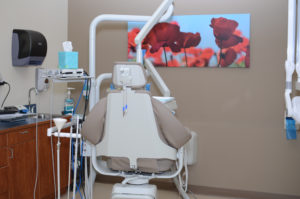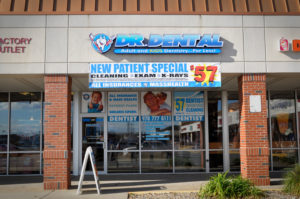
You need regular teeth cleanings for preventing periodontal (gum) disease. However, the condition can be treated with non-surgical procedures, such as scaling and planing. There is healthy gum tissue around each tooth, spanning 1 to 3mm from the top of the gum line to the base. However, if you are afflicted by plaque or tartar, the health of the tissues is affected, which leads to a greater risk of periodontal disease.
When signs of gum disease start appearing, such as bad breath or unhealthy pocket depths of 4mm, your dentist might suggest that you undergo root planing and scaling.
Scaling
Plaque and calculus that attaches to the tooth surfaces is removed during scaling. The procedure specifically targets the area under the gum line and along the root. The dentist will utilize a special tool for this process, called the ultrasonic scaling tool, which virtually irrigates the area below the gums with an antimicrobial agent. This eliminates the bacteria residing there.
Root Planing
Root planing eliminates cementum and surface dentin that is rooted with unwanted toxins, microorganisms and tartar. As the tooth’s root is smoothenedd out, it promotes healing and stops bacteria from building up in the future.
Who Needs It
Plaque is the root cause of almost every gum disease. It is a sticky bacteria film that forms on your teeth and will cause gum inflammation if not cleaned properly. As a result, the gums start to pull away from the teeth and pockets (spaces) are created. This lets plaque to get trapped in these spaces or pockets and it cannot be removed with just brushing. This is not as benign as it may seem in the beginning. Gum disease could eventually lead to tooth and bone loss.
According to a study, chronic periodontitis has been reported in 47.2% of adults who are above 30 years of age in the US in 2015. Professional teeth cleaning can help mitigate this risk, but if detected early. However, once the pockets between the teeth and gums become too deep, scaling and root planing may be required. If you are experiencing swollen, bleeding or sensitive gums, you may require scaling and root planing to heal them. Mobile teeth, which can be caused by a damaged jawbone due to inflammation, can also indicate the need for scaling or planing.
How is the Procedure Performed?
Dental Examination
Prior to starting the procedure, the dentist will first assess the condition of your teeth and gums in detail. During the evaluation, the dentist places a probe between the gums and teeth for recording the severity of gingival inflammation and the depth of the pockets.
Cleaning the Teeth and Gums
The procedure is initiated by administering local anesthesia for a painless process. The dentist will remove calculus and plaque from the tooth surfaces as well as the gingival pockets with ultrasonic instruments. Antibiotic fibers are inserted into the pockets for speeding up the healing process.
Smoothening the Root Surfaces
Following a thorough cleaning of the gums and teeth, the surface of the tooth roots is smoothened out for preventing further plaque deposits.
How Does It Feel After The Procedure?
You might experience moderate discomfort or slight gum bleeding since the procedure involves only mechanical removal of plaque from the teeth. Pain-killers are generally prescribed for taking care of the pain. Moreover, the dentist may also offer you antibiotics for relieving the periodontal infection. During a follow-up visit, the dentist checks on the status and healing of your gums, dental implants, and pockets. No further treatment is required if the gum tissue has responded well to the treatment and remains stable.
On the other hand, depending on the severity of the periodontal condition, you may have to undergo surgical procedures, performed by a periodontist. This will ensure there is no bone loss. That being said, if you have undergone scaling or root planing, the need for surgery is reduced.
Benefits of Scaling and Planing
Scaling and planing presents numerous benefits for people who are suffering from gum diseases. Scaling or planing can prevent major dental concerns which may lead to costlier dental work. Some of the various benefits of root planing and scaling are:
Gum Disease Prevention
Scaling or planing are incredibly effective at curing gum disease and get your gum health back on track.
Tooth Loss Prevention
Decay, infection and large pockets between gums or around the tooth roots can lead to tooth loss. Scaling and planing cures these conditions before any serious consequences.
A Painless Procedure
A local anesthetic to the teeth and gums guarantees a painless process. All food debris, tartar and plaque are removed without any pain or discomfort.
Rapid Recovery
Even though you may experience some pain or bleeding for the first few days, it generally subsides quickly. The dentist will schedule a follow-up appointment to analyze how your gums are healing and assess the size of the healing pockets.
Taking Care after Scaling and Planing
It is important you care for your teeth even after correcting gum diseases with scaling and planing. You should always:
• Brush twice a day using fluoride toothpaste
• Replace your toothbrush frequently
• Floss daily for cleaning dental implants, bridge work or crowns
• Get in the habit of using a mouthwash
• Quit or reduce smoking
Brush your teeth thoroughly but gently if the gum tissues are tender. This normally takes a little more time to heal but by the end of the fourth day, you should assume normal oral hygiene techniques. Mouth rinsing with an antimicrobial rinse, or a warm saline rinse is recommended for at least one or two weeks.
How Much Does it Cost?
The normal cost of periodontal scaling and root planing is between $140 and $210. It varies depending on the severity and complexity of your condition. Other factors affecting the cost of scaling and planing include the type and frequency of the treatment, the technology used and the dentist’s expertise.











